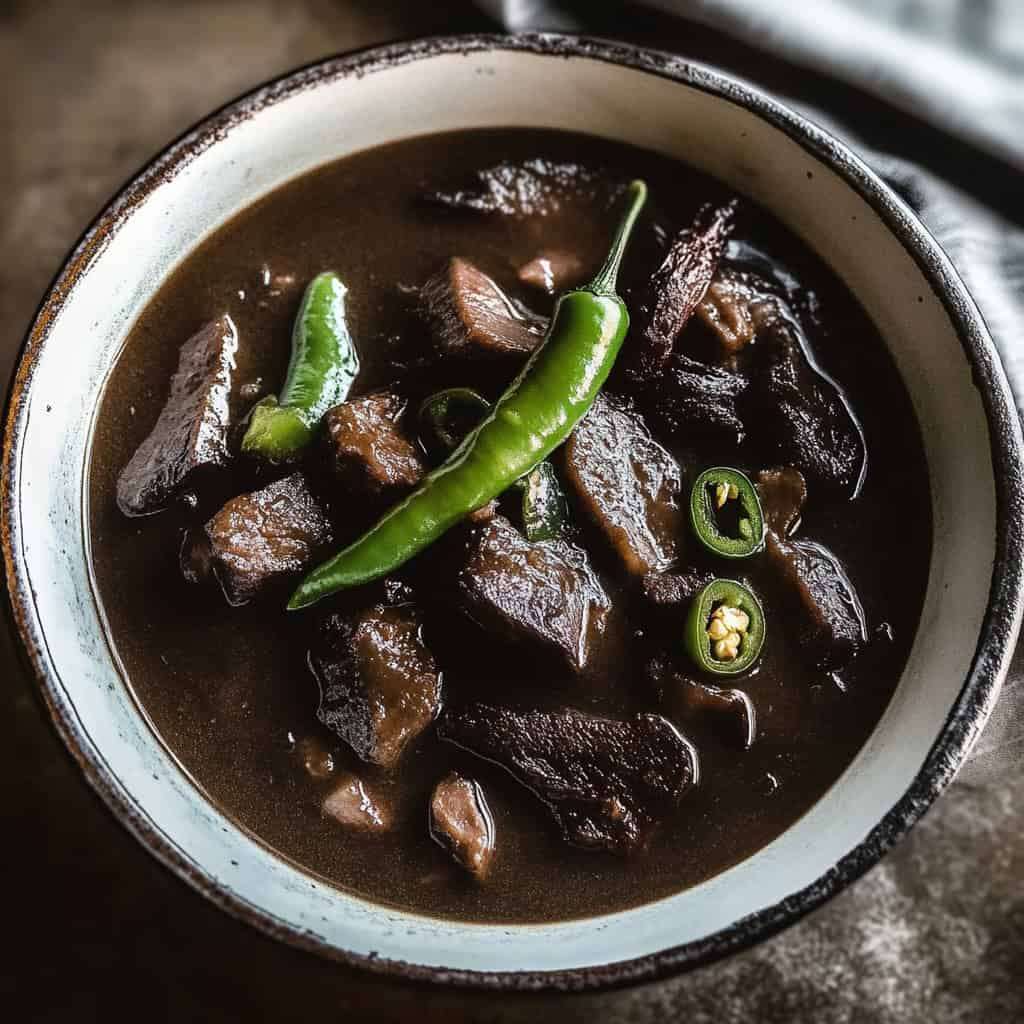
Tinumis sa Sampaloc (Filipino Pork Blood Stew with Tamarind)
Tinumis sa Sampaloc is a distinctive heritage dish from Nueva Ecija and Bulacan in the Philippines that transforms humble ingredients into a sophisticated stew. At its core, the dish features tender cubes of pork belly and offal slowly braised in a complex sauce of pork blood and tamarind extract. While similar to dinuguan, Tinumis sets itself apart through its pronounced sourness from tamarind, creating a delicate balance between richness and acidity. This dish exemplifies Filipino cuisine's resourceful approach to cooking, where every part of the animal is utilized with respect and transformed through skilled preparation into something remarkable. The cooking process involves careful temperature control and timing to achieve its characteristic velvety sauce and perfectly tender meat, making it both a technical achievement and a testament to Filipino culinary heritage.
Ingredients
- 750 g pork belly liempo, cut into 1-inch cubes
- 1¼ cups pigs' blood dugo ng baboy
- 3 cups water tubig
- 6 green finger chilies siling haba
- 1 ripe tomato kamatis, chopped
- 1 whole head garlic bawang, minced
- ½ thumb-sized ginger luya, minced
- 1 large onion sibuyas, finely chopped
- 20 g sinigang mix or 4-5 pieces fresh tamarind/sampaloc
- salt asin to taste
- freshly ground black pepper paminta to taste
Instructions
- First prepare all your ingredients. Cut the pork belly into 1-inch cubes, mince the garlic and ginger, finely chop the onions, quarter the tomatoes, and set aside the green chilies whole. If using fresh tamarind, soak pods in hot water and extract the juice.
- Heat your heavy pot over medium-high heat (190°C/375°F). Add a tablespoon of oil and brown the pork belly pieces until they develop a golden color on all sides, about 8-10 minutes. You want to hear a gentle sizzle, not an aggressive fry.
- Lower the heat to medium (175°C/350°F). Add garlic, onions, and ginger to the browned pork. Sauté everything together until the onions become soft and translucent, around 5-7 minutes. The kitchen should be filled with a fragrant aroma at this point.
- Add the whole green chilies, tomatoes, and your souring agent (either sinigang mix or tamarind extract). Pour in the water and bring everything to a boil. Once boiling, reduce heat to low (150°C/300°F) and let it simmer for 30 minutes, or until the pork becomes tender when pierced with a fork.
- Here comes the crucial step: slowly pour in the pig's blood while continuously stirring in one direction. Keep the heat low (140°C/285°F) and maintain a gentle simmer for 20 minutes. Stir occasionally to prevent the sauce from sticking to the bottom. The blood should thicken the sauce without forming any lumps.
- Season with salt and black pepper to taste. The sauce should be thick enough to coat the back of a spoon. If it's too thick, add water little by little while stirring. If too thin, simmer for a few more minutes.
- Let everything rest for 5 minutes before serving. This allows the flavors to settle and the sauce to achieve the perfect consistency. Serve hot with steamed white rice and extra chilies on the side if you like it spicier.
- Remember, the key to perfect Tinumis is patience and attention to the heat - keep it low and slow once you add the blood, and you'll be rewarded with a smooth, velvety sauce every time.
Notes
- Fresh pig's blood should be mixed with vinegar right after collecting to prevent coagulation
- Cut pork into uniform sizes for even cooking
- If using fresh tamarind, soak in hot water and strain before using
- Stir blood mixture constantly to achieve smooth texture
Nutrition Information
Nutrition Facts
Serving: 6Serving
Amount Per Serving
Calories 450
% Daily Value*
| Calories | 450kcal | 23% |
| Carbohydrates | 12g | 4% |
| Protein | 23g | 46% |
| Fat | 35g | 54% |
| Saturated Fat | 24g | 120% |
| Polyunsaturated Fat | 7g | 41% |
| Monounsaturated Fat | 31g | 155% |
| Cholesterol | 90mg | 30% |
| Sodium | 47mg | 2% |
| Potassium | 280mg | 6% |
| Fiber | 0.2g | 1% |
| Sugar | 1g | 2% |
| Vitamin A | 183IU | 4% |
| Vitamin C | 3mg | 3% |
| Calcium | 12mg | 1% |
| Iron | 1mg | 6% |
* Percent Daily Values are based on a 2,000 calorie diet.